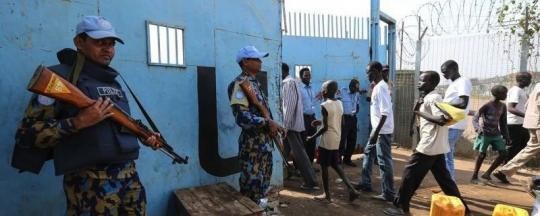The United Nations Mission in South Sudan is shifting its protection of civilians strategy from protecting people within its fortified bases to facilitating them to live in settlements outside direct peacekeeper protection, according to a speech by the mission’s chief.
Since the beginning of the conflict, UNMISS opened its bases’ gates to protect civilians fleeing violence. Over 100,000 civilians are estimated to be sheltering in 8 UNMISS bases around the country.
At a press conference in Juba today, UNMISS chief Ellen Margrethe Loej said the mission is in the process of implementing an alternative protection strategy.
“It is important to remember that these so called Protection-of-civilians sites on UNMISS bases were always envisioned as temporary solutions to protect civilians in imminent danger of physical violence,” Loej said.
“It was not and is not supposed to become permanent settlements. Therefore, we need to focus more on fostering a safe and secure environment outside the UN camps.” The top UNMISS official noted that 1.5 million civilians are displaced outside the bases.
Loej said that so far, UNMISS has closed a compound in Lakes State capital Rumbek, and that protection services in Tomping in Juba will halt by the end of December.
She said that movement of civilians outside of bases will take place “all on a voluntary basis,” and that UNMISS “will work closely” with the police in Juba to encourage IDPs to leave UN camps in the capital.
UNMISS’ continues to partner with South Sudan’s National Police Service despite a change in the mission’s mandate months ago from state-building activities supporting the government to protecting civilians, “in particular when the Government of the Republic of South Sudan is unable or failing to provide such security.”
The UN security council ordered that change in response to the outbreak of civil war in which government security forces, including the SPLA and police, were accused of committing atrocities against South Sudanese civilians.
According to UN Secretary General Ban Ki Moon, under the new mandate “protection priority would be for displaced people sheltering in United Nations compounds and other locations” and that this posture “would be in place until the two sides to the conflict finalized a political agreement.”
The warring parties have yet to reach any such agreement.
All civilians currently sheltering in UMISS bases are in government-controlled areas. Most of them fled to UNMISS bases fearing ethnic violence perpetrated by government security forces.




